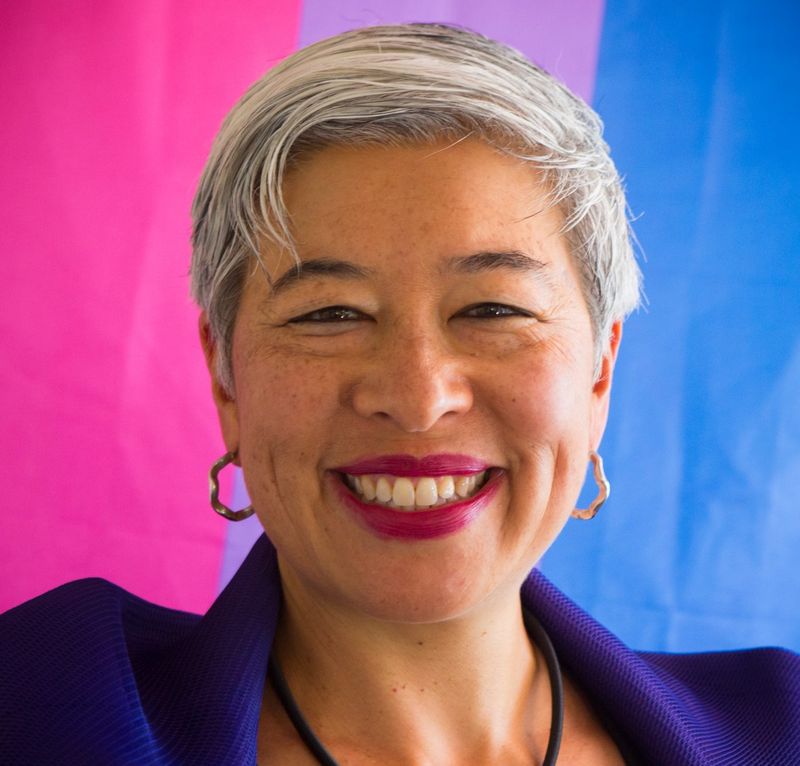
Pre-Conference and Keynote Speakers
1. Tania Israel
 Tania Israel is a Professor of Counseling Psychology at UCSB and award-winning author of Beyond Your Bubble: How to Connect Across the Political Divide, Skills and Strategies for Conversations That Work (APA, 2020). She has shared her expertise on dialogue across political differences on the TODAY show, the New York Times, the Washington Post, NPR, and dozens of other media outlets. Skilled in public speaking and facilitation, Dr. Israel’s work has been received enthusiastically by professional conferences, corporations, campuses, political organizations, campuses, and faith communities. Her expertise in LGBTQ psychology has been solicited by the Institute of Medicine, the National Institutes of Health, and the White House; and she has received honors for her research and advocacy from Congress, the American Psychological Association, and the California Asian & Pacific Islander Legislative Caucus. Dr. Israel has two widely viewed TEDx talks (on bisexuality and how to win a political argument), and her innovation and whimsy are evident in her presentations, performances, and other creative projects. To learn more, visit taniaisrael.com or connect with her on LinkedIn, Twitter, or Instagram.
Tania Israel is a Professor of Counseling Psychology at UCSB and award-winning author of Beyond Your Bubble: How to Connect Across the Political Divide, Skills and Strategies for Conversations That Work (APA, 2020). She has shared her expertise on dialogue across political differences on the TODAY show, the New York Times, the Washington Post, NPR, and dozens of other media outlets. Skilled in public speaking and facilitation, Dr. Israel’s work has been received enthusiastically by professional conferences, corporations, campuses, political organizations, campuses, and faith communities. Her expertise in LGBTQ psychology has been solicited by the Institute of Medicine, the National Institutes of Health, and the White House; and she has received honors for her research and advocacy from Congress, the American Psychological Association, and the California Asian & Pacific Islander Legislative Caucus. Dr. Israel has two widely viewed TEDx talks (on bisexuality and how to win a political argument), and her innovation and whimsy are evident in her presentations, performances, and other creative projects. To learn more, visit taniaisrael.com or connect with her on LinkedIn, Twitter, or Instagram.PRE-CONFERENCE WORKSHOP (May 29, afternoon program)
Navigating Political Division in Clinical and Campus Contexts
Political differences are roiling our country, campus communities, and student mental health. How can college counseling centers equip students to face the challenges of political division? When political differences are present in clinical settings, what approaches can therapists take that are consistent with ethical obligations, professional principles, and personal values? What advocacy strategies are both effective and authentic within polarized situations? Drawing on psychological science and skills, Dr. Israel will offer ethical, evidence-based approaches for bridging political differences.
LEARNING OBJECTIVES
By the end of this program, participants will be able to:
-
-
- Recognize the impact of political division on college student mental health.
- Apply ethical approaches to working across political differences in clinical settings
- Cultivate college students’ capacity to navigate hostile campus environments
- Identify effective advocacy strategies within polarized situations
-
KEYNOTE ADDRESS
All I Need to Know About Political Conflict, I Learned From The Wizard of Oz
Roiled by social media algorithms, provocative news, and clashing politicians, campus staff, faculty, students, and administrators are experiencing the impact of national political division. Interpersonal relationships, mental health, and community belongingness are stretched to the breaking point. Drawing on a familiar and imaginative narrative, Dr. Israel takes her audience on a journey down the yellow brick road to help them navigate the challenges of living in politically polarized times. This program will employ evidence and insights to help attendees feel informed, empowered, and optimistic.
LEARNING OBJECTIVES
By the end of this program, participants will be able to:
-
-
- Identify polarizing media
- Recognize cognitive biases that exacerbate polarization
- Apply perspective taking across ideological differences
- Help college students develop the psychological capacity to navigate politically divisive situations
-

2. CCMH – Brett Scofield, Natalie Hernandez, Caitlin Chun-Kennedy, & John Mitchell
 The Center for Collegiate Mental Health (CCMH) at Penn State University is an international practice-research network of over 800 colleges and universities whose mission is to bridge the gap between science and practice in college counseling centers. CCMH collects and analyzes
The Center for Collegiate Mental Health (CCMH) at Penn State University is an international practice-research network of over 800 colleges and universities whose mission is to bridge the gap between science and practice in college counseling centers. CCMH collects and analyzesde-identified data as part of the routine practice when students seek mental health treatment at colleges and universities. The information is used, in turn, to benefit college counseling centers, administrators, researchers, the public, and most importantly the students receiving services. Visit their website, https://ccmh.psu.edu/, for more information.
LEARNING OBJECTIVES
By the end of this program, participants will be able to:
-
-
- Identify two collegiate mental health trends that are increasing over the past decade
- Explain two ways college counseling centers contribute to student success
- List the three general mental health symptoms affected by students’ experiences of discrimination
- Identify two primary areas where marginalized communities have been negatively impacted since the onset of the pandemic
- Demonstrate two clinical interventions that can be utilized to address discrimination and race-based trauma in a therapy setting
-

